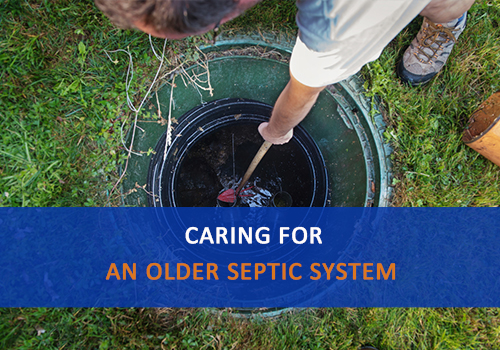Maybe you just bought a house with an older septic system, or maybe your system is getting older with time, and you want to do what you can to preserve it.
The U.S. Environmental Protection Agency considers septic systems to be “potentially viable, low-cost, long-term approaches to wastewater treatment if planned, designed, installed, operated, and maintained properly.”
Septic systems generally last 20 to 25 years, depending on the tank’s construction materials. There are some cases of systems lasting much longer if cared for properly. It is easier and more efficient to maintain an older septic system than to pay for expensive repairs or even a new system. The average cost of replacing a septic system is between $4,312 and $6,540.
You may feel overwhelmed at the thought of maintaining an aging septic system. But there are many simple things you can do as a homeowner to care for an older system, extending its life (and saving you money in the meantime).

Tips to Extend the Life of Your Older Septic System
Spread Out Water Usage
Using too much water at once throughout the house can flood your septic system. Septic Systems process water slowly, and too much water at once can be too much for the system to handle. It can cause the layer of fat and grease to rise and potentially cause blockages, forcing water from the system back up the pipes and into your home.
Do not do too many loads of laundry at once. If you have multiple loads, spread them out throughout the week. Avoid showering if someone else in the household is already doing so. Also, in Florida, it may be possible to reroute the washing machine water to the lawn. This will take some stress off of your aging septic system and water your lawn in the process.
Conserve Water
Spreading out your water usage is beneficial, but you might also consider conserving water in general. It will take some strain off your older system if you install toilets and showerheads that conserve water. Energy-efficient shower heads can save 25-60% of water. And energy-efficient toilets can save 13,000 gallons of water and 140$ per year.
There are also energy-efficient options for washing machines, dishwashers, and other household appliances. It is worth researching these options to preserve your septic system and save you money over time.
Do Not Flush Rules
It may not be fun to talk about, but it’s important to know what you can and cannot flush. The basic rule is toilet paper only. These other frequently flushed items can cause serious damage to a septic system:
- Disposable wipes
- Dental floss
- Tampons
- Condoms
- Cotton balls
- Q-Tips
And toilets aren’t the only appliances to consider. It is also harmful to pour cooking grease or strong chemicals down the drain. Avoid using bleach or strong chemicals too often. These can disrupt the bacteria in the tank, causing the septic system to malfunction.
Do Not Build or Park on Top of the Septic System
You can crush your septic system, causing cracks that will require a full system replacement. Do not build anything on top of the system, including the septic tank and the leach field. The septic tank is not made to support any more weight than the dirt on top of it. A building would also block access to the tank, which is needed for inspections and maintenance. Do not park vehicles over the area, and avoid driving over the area.
Check Plumbing for Leaks
Regularly check your plumbing for leaks. One small leak can cause 1,661 gallons of water to flood the septic system and can cost 35$ per year that you could use to go out to dinner or a movie.
Get Regular Inspections
Getting an inspection by a qualified professional is one of the most important things you can do to extend your septic system’s life. Florida water management recommends that you get a septic system inspection every two to three years. A septic system professional can ensure that your system is running optimally, recommend repairs if needed, and pump the system for you.
Pump Your System
Even if you do everything you can to maintain your septic system, it will not last if you do not get it pumped by a septic system company. The Florida Department of Health recommends getting your septic system pumped every four to five years.
Follow these tips, and your septic system will serve you for years. If you are still feeling overwhelmed, call a professional, and they will help you get started with an inspection so you can move forward with your care and maintenance plan.

